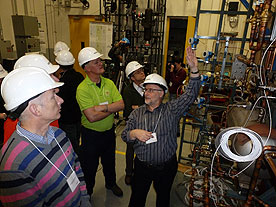SENT explores energy efficiency for the military in cold climates
NATO's Smart Energy Team (SENT) was launched at the end of 2012 to advance energy efficiency in the military. As part of its first field-trip, the team of experts from 8 nations visited an energy camp set up by Defence Research & Development Canada near Montréal from February 19-21.

The aim of the trip was to demonstrate energy solutions in a cold environment. To this end, the techniques that were applied included load-adjustable generators, heat exchange pumps, floor-heating, heat/energy storage insulation material for tents, and solar power generation. The participants quickly came to realise the differences between a standard tent and one that was upgraded. For Dr. Susanne Michaelis, International Staff at NATO’s Emerging Security Challenges Division and action officer for SENT, "in the standard tent my feet froze to ice chunks, whereas in the modern tent with floor heating, insulation, and less fuel consumption, I felt comfortable”.

At their meeting in Canada, SENT identified three priority topics for multinational Smart Energy projects including data collection on energy performance, micro grids, and alternative power generation. These topics will be further developed in the coming months. SENT's next milestone will be the demonstration of a multi-national Smart Energy component in the large military exercise "Capable Logistician 2013" (CL13) that will take place in Slovakia in June this year. The exercise is co-organised by the Multinational Logistics Coordination Centre (MLCC) in Prague.
SENT is supported within the framework of the NATO Science for Peace and Security (SPS) Programme and co-directed by the NATO Energy Security Centre of Excellence (ENSEC COE) in Lithuania and the Swedish Armed Forces, Joint Environmental Department.
